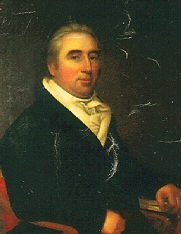 Today, President Barack Obama delivered a late amicus curiae brief with the US Supreme Court, from the Rose Garden of the White House, in support of the law colloquially known as "Obamacare." In it he implicitly urged the justices to overrule a case he evidently considers ancient, overreaching, and poorly written titled William Marbury v. James Madison. A little background is necessary.
Today, President Barack Obama delivered a late amicus curiae brief with the US Supreme Court, from the Rose Garden of the White House, in support of the law colloquially known as "Obamacare." In it he implicitly urged the justices to overrule a case he evidently considers ancient, overreaching, and poorly written titled William Marbury v. James Madison. A little background is necessary.On March 3, 1801, President John Adams, just before his term expired, signed a series of commissions, appointing members of his party to a variety of judicial offices. One William Marbury, a native of Maryland and a prosperous financier, was active in Maryland politics and a vigorous supporter of the Adams presidency. His office was to be justice of the peace in the DC District.
On the following day, Marbury's appointment was approved by the Senate; however, to go into effect, the commissions had to be delivered to those appointed ("Signed, sealed and delivered, I'm yours"). Delivery to Marbury did not take place prior to Adams' exit from office, and the commission expired.
Mr. Marbury sued, taking his case directly to the Supreme Court on the basis of a jurisdictional law passed by Congress. Here is where it gets interesting.
Forty-eight year old Chief Justice John Marshall, a Revolutionary War veteran (Valley Forge survivor) and friend of George Washington, wrote the opinion for the court, a decision now widely known as Marbury v. Madison. How widely known?
Law student Obama, a 1L at Harvard, would have read this case. Law Professor Obama may have taught it. President Obama's White House counsel would surely have reminded him of its holding. To wit:
Justice Marshall announced in 1803, and it has been the law of the land since, that the Supreme Court may find laws passed by Congress, and signed by the president, unconstitutional. Specifically, that the law vesting the Supreme Court with original jurisdiction (permission to hold the first trial in a lawsuit) to hear the Marbury case was void because it modified part of the Constitution. Of course, only by the amendment process can that occur. From this small, administrative matter arose the lofty principle that the Supreme Court is...well...supreme.
President Obama must know this. Consequently, his pronouncement in the Rose Garden suggests that his admonishment to the Court - that they find his capstone social program constitutional "because it is" and because it passed with "a strong majority" is either profoundly unenlightened, or evidence that he has freed himself of the burdens of governance for the lofty expressions and careless rhetoric of the campaign trail.
Either way - Mr. Marbury never got his commission, but Americans were blessed with a system of laws that vests in a group of men and women, beholden to no one, the task of safeguarding the US Constitution. Whatever they decide in the Obamacare case, it will be because a majority believe in a ruling based in the Constitution, not because of a presidential harangue delivered on his front lawn.
I suggest that Mr. Marbury's sacrifice was worthy of a patriot.
UPDATE: "The Obama administration warned the Supreme Court this week via papers filed with the Court that if Obamacare is struck down, there will be an “extraordinary disruption” in Medicare. Via Beitbart's Big Government, the full text is here, the Detroit Free Press story here. I suppose this kind of stuff happens all of the time, but....
C'mon, man!
*Wikipedia was the source of the historical background of Marbury v. Madison and the life of Chief Justice John Marshall.
Maybe he needs to go back to his Government Class in high school and watch "How a Bill Becomes a Law". Very educational, and fun to watch, to boot!
ReplyDelete